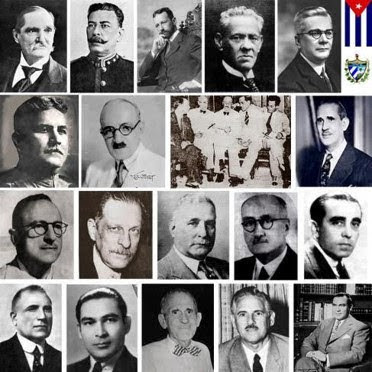From bad (authoritarian dictatorship) to worse (totalitarian dictatorship)
 |
| #TheyAreContinuity #TheyAreDictators ( #SomosContinuidad #SonDictadores) |
Democracy ended in Cuba seventy years ago on March 10, 1952. It was ended by General Fulgencio Batista who carried out a military coup against the legitimately elected democratic government. The last democratically elected president, Carlos Prio, and his first lady went into exile, and over the next seven years, an authoritarian dictatorship ruled Cuba, becoming increasingly unpopular.
The refusal of Batista to give up power through a process of dialogue opened the path for Fidel and Raul Castro to violently seize it, but they did not do it alone.
They had the help of the Communist International, The New York Times, an arms embargo placed on Batista in March 1958 by the United States, and pressure from the U.S. Ambassador to Cuba in December 1958, the authoritarian dictator fled Cuba in the early morning hours of January 1, 1959.
 |
| Presidents of Cuba from 1902 to 1952 and dictator Batista |
This put an end to a half century of democratic Cuban governments, and within nine years the Castro regime seized Cuban's private sector and centralized economic control under Havana's totalitarian communist dictatorship. Cuba's official motto was changed from Homeland and Liberty (Patria y Libertad) by the new communist regime to Homeland or Death, We Shall Triumph (¡Patria o Muerte, Venceremos!).
Since the beginning of their struggle in 1953, the Castro brothers pledged a democratic restoration in Cuba, but all along planned a Marxist-Leninist takeover and the imposition of a totalitarian communist dictatorship, killing tens of thousands of Cubans. They systematically denied human rights to all Cubans while exporting their repressive model to Africa and Latin America, creating misery for millions.
 |
| Firing squads in Cuba ordered by the Castro brothers |
The Communist regime rewrote Cuban history, creating myths to justify its tyrannical rule. The reality was that between 1902 and 1952, there existed in Cuba a system that had overseen rising living standards for five decades and had been on the cutting edge of human rights. The Marxist-Leninist dictatorship would declare war on human rights at home and abroad.
Generations of Cubans resisted this communist dictatorship from 1959 to the present.
Tens of thousands of Cubans risked everything in July 2021, taking to the streets in peaceful protests demanding an end to the dictatorship. The Castro regime responded by firing on unarmed protesters, imprisoning hundreds, and condemning many of them to 20 and 30 year prison sentences over the Christmas holidays for exercising their right to peaceful assembly.
 |
| On the streets of Cuba on July 11, 2021 |
On this March 10th, as Cubans observe 70 years without democracy and pledge to redouble their efforts to achieve a democratic restoration in Cuba it is a good moment to condemn the Castro dictatorship for its 63-year betrayal of the democratic aspirations of the Cuban people. It is a good day to remember President Carlos Prio Socarrás and his wife Mary Tarrero de Prio.
 |
| President Carlos Prio Socarrás and his wife Mary Tarrero de Prio |
Peaceful protests outside of Cuban embassies that recognize the reality that the Castro brothers overthrew an authoritarian dictatorship that had been in power for seven years to impose a totalitarian one that has marked 63 years in power and continues to silence and jail non-violent dissidents, and when they are too effective in their activism, kill them.
If you can't make it to the Embassy, then at least take action signing this appeal for an end to repression in Cuba and release of all Cuban political prisoners addressed to the international community.





Two things not to forget:
ReplyDelete1. Batista was running Cuba behind the scenes for many years prior to his coup in 1952.
2. Batista's real mistake was in amnestying Fidel and Raul from the Isle of Pines shortly after the attack on Moncada.
Batista had been involved in the 1933 revolution against Machado and became a strong man behind the scenes, but he formally became president in 1940, with the help of the communist, and in 1944 power was handed over to his enemies in the Autentico Party through free and fair elections in 1944 to the new president Ramon Grau San Martin.
DeleteBatista’s “real” mistake was destroying the democratic order that he helped to create with the process that led to the drafting of the 1940 Constitution, and his unwillingness to leave power peacefully through a process of dialogue. This opened the space to political violence that legitimized thugs like the Castros.
Delete